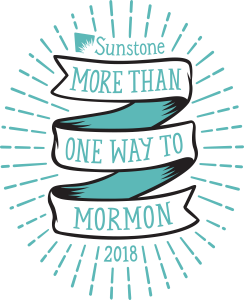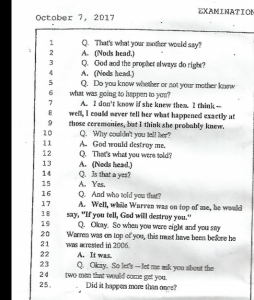This weekend, the President of The Church (the Mormon one) reminded the world that The Gospel isn’t for everyone.
I’m completely serious. Let me explain.
At the 2018 October General Conference, the prophet and President of the Restored Gospel of Jesus Christ spoke firm words that he called, “a matter of great importance.” He spoke about changing the name of the church and refraining from using the nickname “Mormon” when referring to the Church of Jesus Christ of Latter-day Saints. He referred to revising the style guide as “not a name change, it is not rebranding. It is not cosmetic. It is not a whim. And it is not inconsequential. Instead it is a correction. It is the command of the Lord.”
He said, “When the savior clearly states what the name of his church should be, and even precedes his declaration with, ‘Thus shall my church be called,’ he is serious. And if we allow nicknames to be used and adopt or even sponsor those nicknames ourselves, he is offended.”
I sympathize with this. I wouldn’t want to offend God. We know what happens to people that offend God. Let’s just say it doesn’t go well for them.
I am someone who pays particular attention to that word, “offend.” It’s showed up in the Mormon discourse many times, often playing interesting and specific roles. For example, the church news published an article in 2006 stating that being offended was a sign of spiritual weakness and immaturity. I have been accused of being offended many times when I offer a critique of my own faith community.
“And then I would say something like this. “Let me make sure I understand what has happened to you. Because someone at church offended you, you have not been blessed by the ordinance of the sacrament. You have withdrawn yourself from the constant companionship of the Holy Ghost. Because someone at church offended you, you have cut yourself off from priesthood ordinances and the holy temple. You have discontinued your opportunity to serve others and to learn and grow. And you are leaving barriers that will impede the spiritual progress of your children, your children’s children, and the generations that will follow.” Many times people would think for a moment and then respond: I have never thought about it that way.
The bishop and I would then extend an invitation: “Dear friend, we are here today to counsel you that the time to stop being offended is now. Not only do we need you, but you need the blessings of the restored gospel of Jesus Christ. Please come back—now.””
What this means is, when we let things get in the way of letting us see the individual, prohibiting us from loving the person behind the offense, we lose out on blessings.
I wonder, do those same principles apply to God? What blessings does God lose out on if He becomes offended every time I use the word Mormon to describe His church? Of course God doesn’t need blessings. We know this. It is His job to bless us.
Nelson addressed the fact that some critics found the name change trivial when there are so many other pressing issues going on in the world. He assured us that this was a very important revelation from God. If we assume that God does indeed need us to correct our language, in the midst of environmental crises, deadly natural disasters, poverty, hunger, and violence, I am still left confused.
But why then would God get offended by a nickname? The theological argument is perplexing. I would have thought God had a thicker skin.
Would God, a Being who has witnessed thousands of years of human history- the God who saw millions of His children suffering in the chains of slavery, of suffering modern-day mass rape and child labor on the Ivory Coast, of torture and terror and exploitation- would He find offense when I don’t “responsibly use the style guide?”
President Nelson says yes. He tells us that every time someone uses the word “Mormon,” Satan has a victory. Perhaps this is why I’m not a very good Latter-day Saint. I’m too flippant with things like language. I use the term “Mormon” to broaden the scope of what it means to be a disciple of Christ.
At Sunstone, we’ve incorporated the phrase, “There’s More Than One Way to Mormon.” We adopted this idiom because I grew up with a firm testimony that the Gospel of Jesus Christ was for all people. I listened when the prophets told me it was available to all that were earnestly seeking it. Being a Latter-day Saint meant extending an invitation to all to accept the Gospel. Using the term “Mormon” was just a mechanism to extend belonging to more, especially those who feel like they don’t belong in The Church (the Restored Gospel of Jesus Christ one).

If your theology cannot bring hope to the most marginalized, the most vulnerable, the “Least of These,” then it’s not good theology. In fact, we have a word for that- it’s called harm. I would even go so far as to say it is “using the Lord’s name in vain.” I firmly believe that every time we exclude and marginalize in the name of God, we are using the Lord’s name in vain.
This is why I say that Nelson reminded us that the Gospel isn’t actually for everyone. The term “Mormon” is too broad, its reach too far. He has made it clear that we have another opportunity to signal our loyalty to God. We can add this to our checklists of what makes a good Mormon, er, Latter-day Saint, from a bad one. Don’t wear a tank top, shop on Sunday, and use acronyms for the Lord’s church.
I never suspected, the God of all things- the one who was with me in my darkest times, who has been with me when I’ve sat with survivors of sexual assault, or families that just lost their LGBT child to suicide- that that same God would be so sensitive.
I can see now, that President Nelson believes God cares about much more trivial things. Of course, I’m not a prophet so it’s likely I am missing the bigger picture in the grand scope of human history.In a limited characters social media world, maybe God is really testing us to make sure we don’t offend. Our foremothers had the plains and covered wagons to shape their testimonies, and we have to weather the trials of concise tweets.
In this confusion, thankfully we have instruction. In the words of Elder Bednar, I would invite President Nelson (and apparently God?) to remember these words:
“When we believe or say we have been offended, we usually mean we feel insulted, mistreated, snubbed, or disrespected. And certainly clumsy, embarrassing, unprincipled, and mean-spirited things do occur in our interactions with other people that would allow us to take offense. However, it ultimately is impossible for another person to offend you or to offend me. Indeed, believing that another person offended us is fundamentally false. To be offended is a choice we make; it is not a condition inflicted or imposed upon us by someone or something else.”
If the Lord, or His servants, or anyone else for that matter gets offended when folks like myself use the term Mormon, I’m just going to refer them to the words of the servants on the watchtower:











